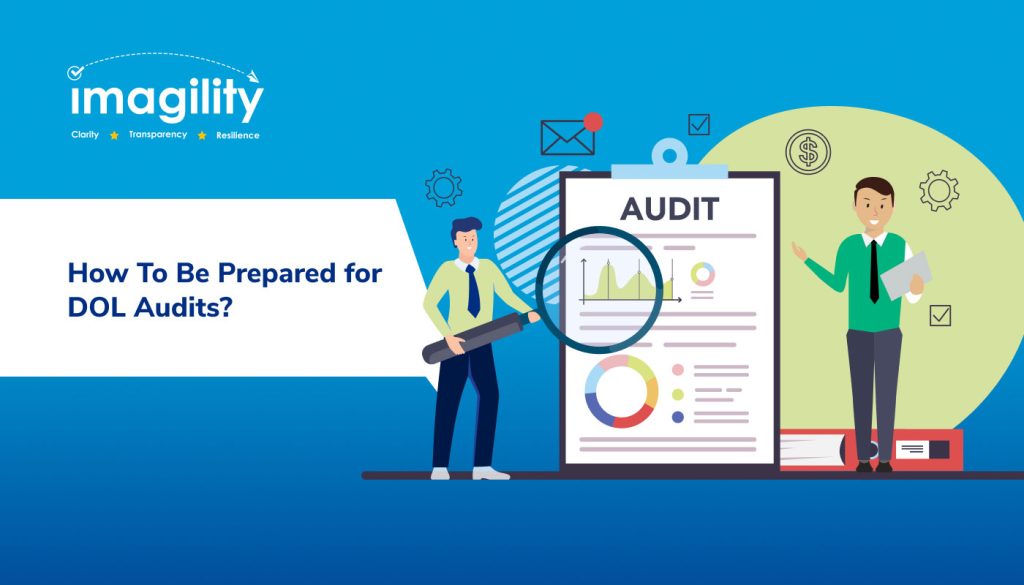Table of Contents
- Stay Informed About Labor Laws
- Conduct Regular Internal Audits
- Maintain Accurate Records
- Have An Employee Handbook
- Train Managers and Staff
Employers have noticed an uptick in DOL audit visits, causing apprehension among many. DOL, which stands for the Department of Labor, is responsible for reinforcing federal laws, including the Family and Medical Leave Act (FAML), The Employee Retirement Income Security Act (ERISA), and the Fair Labor Standards Act (FLSA).
The DOL conducts these audits to ensure employers comply with the rules and regulations. However, the reason for DOL audits is not predictable, but it may take place in response to employee complaints or suspicions of labor law violations.
Failure to follow compliance can jeopardize visa status, deport employees, and result in blocklisting, preventing companies from filing LCAs and even criminal proceedings against employers.
As an employer, preparing for DOL audit visits is crucial to avoid penalties and unwanted attention. In this blog, we will guide you on how to survive DOL audits, ensuring that your business remains compliant and free from unnecessary legal troubles.
Let’s begin,
1. Stay Informed About Labor Laws
Staying informed about labor laws is essential for employers. Labor laws are subject to change, and it’s crucial to be aware of federal and state regulations that apply to your industry and business. Regularly reviewing labor laws helps you ensure that your employment practices, policies, and procedures are in compliance with the latest legal requirements. It also helps you avoid costly penalties and legal issues.
2. Conduct Regular Internal Audits
Internal audits are proactive measures employers must take to assess and evaluate their employment practices, policies, and records. These audits serve several important purposes in preparing for DOL audits:
- Identification of Compliance Issues
Conducting regular internal audits helps employers identify potential compliance issues and discrepancies in their employment practices before they come under scrutiny during a DOL audit. This proactive approach allows for timely correction and mitigation of compliance risks.
- Documentation Review
Internal audits involve a thorough review of records related to employee compensation, hours worked, benefit plans, classification of employees (exempt/non-exempt), and adherence to employment policies. Ensuring these records are accurate and up-to-date is crucial.
- Policy Assessment
Employers can use internal audits to assess the effectiveness and compliance of their employment policies and procedures. This includes evaluating policies related to overtime, FMLA, workplace safety, and anti-discrimination.
3. Maintain Accurate Records
Maintaining accurate records is critical to preparing for Department of Labor (DOL) audits. Accurate recordkeeping is a legal requirement and a fundamental practice that helps employers comply with labor laws. Here’s how maintaining accurate records is essential:
- Legal Requirement
Federal and state labor laws require employers to maintain detailed records related to various aspects of employment, including hours worked, wages, benefits, and employment practices. Failure to do so can result in legal consequences and penalties.
- Demonstrate Compliance
Accurate records serve as evidence that your company complies with labor laws. During a DOL audit, auditors will review these records to verify compliance with regulations such as the Fair Labor Standards Act (FLSA), the Family and Medical Leave Act (FMLA), and the Employee Retirement Income Security Act (ERISA).
- Audit Preparation
Well-maintained records make the audit process smoother. When DOL auditors request documentation, having organized and accurate records readily available can help streamline the audit and demonstrate your commitment to transparency.
4. Have An Employee Handbook
An employee handbook is a vital tool for any organization, and having a comprehensive one is particularly crucial when preparing for Department of Labor (DOL) audits. Here’s why a comprehensive employee handbook is essential:
- Policy Communication
An employee handbook serves as a centralized resource for communicating company policies, procedures, and expectations to employees. It provides clarity on how the organization operates and what is expected of employees in various situations.
- Reference Guide
Employees can refer to the handbook when they have questions or concerns about company policies or labor laws. It empowers employees with knowledge and ensures they have access to important information.
5. Train Managers and Staff
Training managers and staff is crucial to being prepared for Department of Labor (DOL) audits. Proper training ensures your workforce is well-informed about labor laws, compliance requirements, and best practices. Here’s why training is essential:
- Reduce Error
Well-trained staff are less likely to make errors that could result in compliance issues. Training provides employees with the knowledge and skills they need to accurately record hours worked, manage employee classifications, and handle workplace policies in accordance with the law.
- Consistency
Training ensures that all employees and managers are on the same page regarding compliance. Consistency in applying labor laws across the organization reduces the risk of discrepancies that could arise during a DOL audit.
- Recordkeeping Practices
Training covers the importance of accurate recordkeeping and the proper methods for documenting hours worked, leaves of absence, and other relevant information. It reinforces the significance of maintaining organized and up-to-date records.
Conclusion
Preparing for DOL audits is essential to avoid legal and financial consequences. You can significantly reduce non-compliance risk by staying informed about labor laws, maintaining accurate records, and conducting internal audits.
Seek legal counsel when needed, cooperate with auditors, and take corrective action promptly if issues are identified. By following these steps, you can confidently navigate DOL audits, ensuring that your business remains compliant and focused on its core objectives. You can also take the help of Imagility, a top-notch immigration software that helps you stay compliant with DOL rules and regulations.










